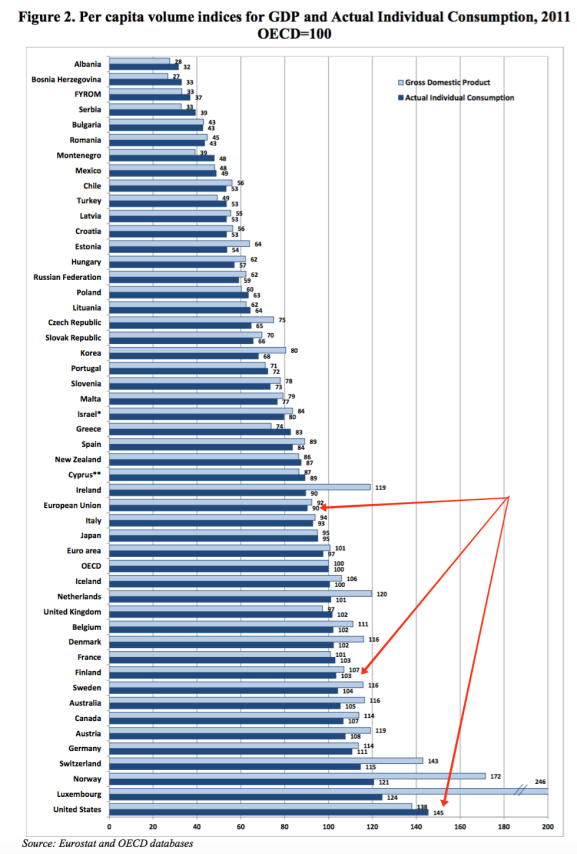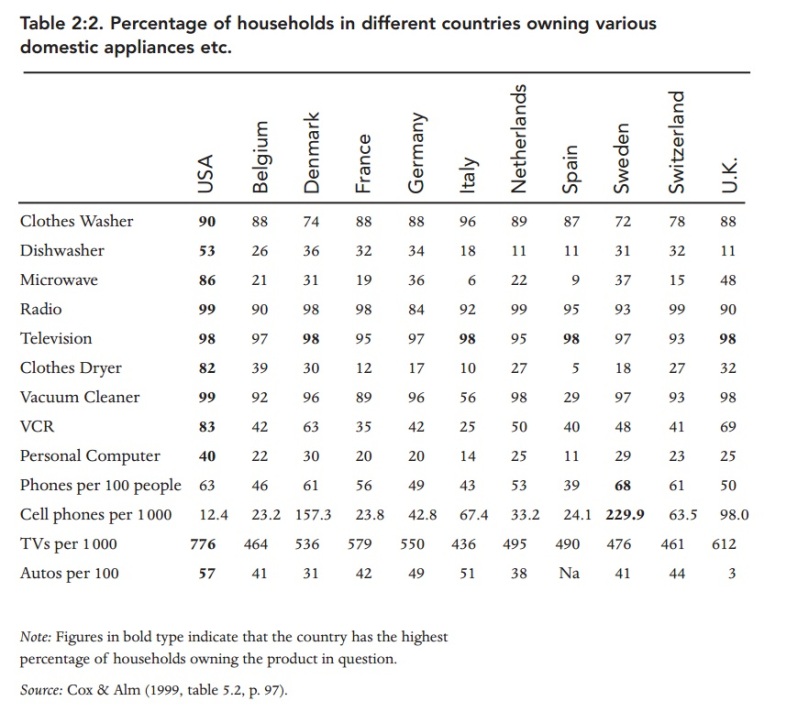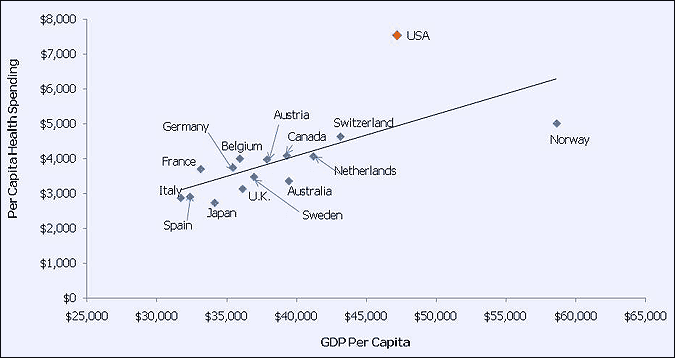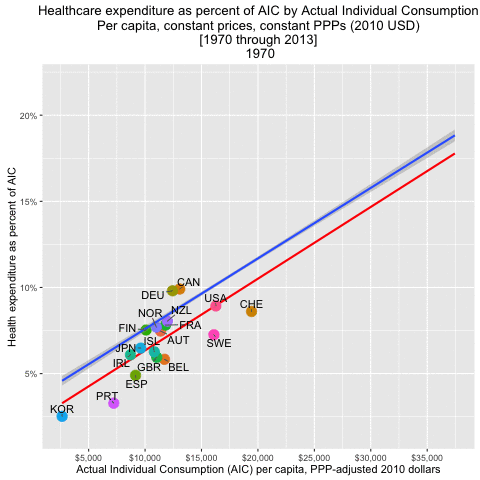Consumption vs. GDP
Random Critical Analysis has a really interesting blog post from a while ago, on the difference between consumption and income as measures of well being. The level of data analysis and detail on that blog is really impressive.
The narrow question is whether the US spends "too much" on healthcare. A counterargument has always been, what else should we spend money on? As a society gets wealthier, it's natural to spend more on health care, just as we spend more on art, travel, and so forth.
(The counterargument to that is, whether we spend more or less is beside the point. The point is a dysfunctional regulated oligopoly is charging way too much for what we get. It's not so bad to spend this much, it's bad to get such a bad deal.)
So, the question is not whether the US spends more on health care, the question is whether we spend more on health care relative to a measure of our standard of wealth. Using GDP as a rough proxy, we spend a lot more on health care relative to GDP than other countries.
But, the larger point of the blog post, on which I'll focus -- consumption is not GDP (income). Americans are far better off relative to other countries than we think we are. See the graph:
The actual standard of living -- consumption -- is higher in the US than in any of these other countries. Many of them have higher GDP. What's going on? Well, Ireland, for example, hosts a lot of international companies. These chalk up a lot of GDP in Ireland -- a lot seems to be "produced" in Ireland -- but much of it does not go to Irish people. Similarly Switzerland and Luxembourg.
To the narrow question, US healthcare expenses look out of line compared to GDP
The narrow question is whether the US spends "too much" on healthcare. A counterargument has always been, what else should we spend money on? As a society gets wealthier, it's natural to spend more on health care, just as we spend more on art, travel, and so forth.
(The counterargument to that is, whether we spend more or less is beside the point. The point is a dysfunctional regulated oligopoly is charging way too much for what we get. It's not so bad to spend this much, it's bad to get such a bad deal.)
So, the question is not whether the US spends more on health care, the question is whether we spend more on health care relative to a measure of our standard of wealth. Using GDP as a rough proxy, we spend a lot more on health care relative to GDP than other countries.
But, the larger point of the blog post, on which I'll focus -- consumption is not GDP (income). Americans are far better off relative to other countries than we think we are. See the graph:
 |
| Source: Random Critical Analysis |
Much of the difference shouldn't last forever of course. How does the US consume more than we produce (GDP)? We borrow from abroad, and run trade deficits. Eventually that lending must be paid back. (Or at least those lending it to us hope so. We'll see.) Norway is the opposite. They produce a lot of oil, but use the results to save abroad in their sovereign wealth fund, which eventually they can draw on to finance consumption. (Or so they hope, also.)
In the meantime, though, the difference between income and consumption is quite large.
This difference is even more important in the cross-section. Income variation is often transitory -- you might have a bad year -- and consumption lasts longer. People in bad years draw down savings, borrow, or get help from relatives. Most of all, super-rich people save a lot. So inequality of consumption -- of actual standard of living -- is much smaller than inequality of one-year income or wealth.
RCA anticipates your first objection
this consumption measure includes government transfers, subsidies, etc, notably including the vast majority of healthcare and education spending, as Actual Individual Consumption (AIC) does.
Since some people earlier seemed to miss to this point, I’ll repeat: the only form of consumption excluded from AIC is that which cannot be attributed directly to individuals or households, i.e, collective expenditures by government like military procurement and the like.I.e. the one thing that is also much larger in the US. And RCA adds nice confirmation. The average US person lives in twice as much space as the average european. And
 |
but not at all relative to consumption. (Note the cool dynamic graph)
The post has lots more beautiful graphs on consumption and health care expenditures. But the main point -- consumption, not income (and especially not one year's income) is a much better measure of living standards -- is larger, and my point, so I'll stop here.
Oh, and I still think we're getting a massively raw deal from our inefficient health care system. As is much of europe.





0 yorum:
Post a Comment